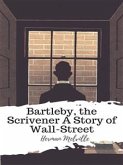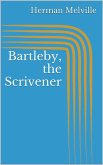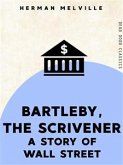Bartleby, The Scrivener Herman Melville - The narrator is an unnamed elderly lawyer who works with legal documents and has an office on Wall Street. He already employs two scriveners, Turkey and Nippers, to copy legal documents by hand, but an increase in business leads him to advertise for a third. He hires the forlorn-looking Bartleby in the hope that his calmness will soothe the other two, each of whom displays an irascible temperament during an opposite half of the day. An office boy nicknamed Ginger Nut completes the staff.At first, Bartleby produces a large volume of high-quality work, but one day, when asked to help proofread a document, Bartleby answers with what soon becomes his perpetual response to every request: "I would prefer not to." To the dismay of the narrator and the irritation of the other employees, Bartleby begins to perform fewer and fewer tasks and eventually none. He instead spends long periods of time staring out one of the office's windows at a brick wall. The narrator makes several attempts to reason with Bartleby or to learn something about him, but never has any success. When the narrator stops by the office one Sunday morning, he discovers that Bartleby is living there. He is saddened by the thought of the life the young man must lead.Tension builds as business associates wonder why Bartleby is always present in the office, yet does not appear to do any work. Sensing the threat to his reputation, but emotionally unable to evict Bartleby, the narrator moves his business to a different building. The new tenant of his old office comes to ask for help in removing Bartleby, and the narrator tells the man that he is not responsible for his former employee. A week or so after this, several other tenants of the narrator's former office building come to him with their landlord because Bartleby is still making a nuisance of himself; even though he has been put out of the office, he sits on the building stairs all day and sleeps in its doorway at night. The narrator agrees to visit Bartleby and attempts to reason with him. He suggests several jobs that Bartleby might try and even invites Bartleby to live with him until they figure out a better solution. Bartleby replies that he would "prefer not to make any change", and declines the offer. The narrator leaves the building and flees the neighborhood for several days, in order not to be bothered by the landlord and tenants.
Dieser Download kann aus rechtlichen Gründen nur mit Rechnungsadresse in B, BG, D, DK, EW, FIN, F, GR, IRL, I, HR, LR, LT, L, M, NL, PL, P, R, S, SK, SLO, E, CZ, H, CY, A ausgeliefert werden.









